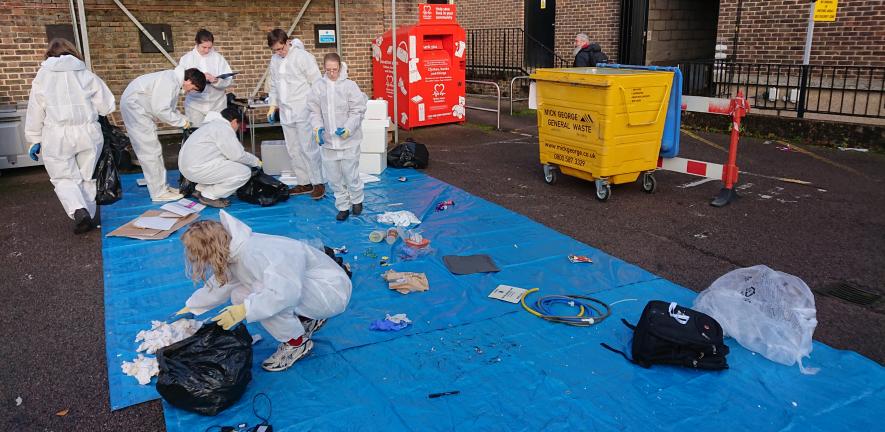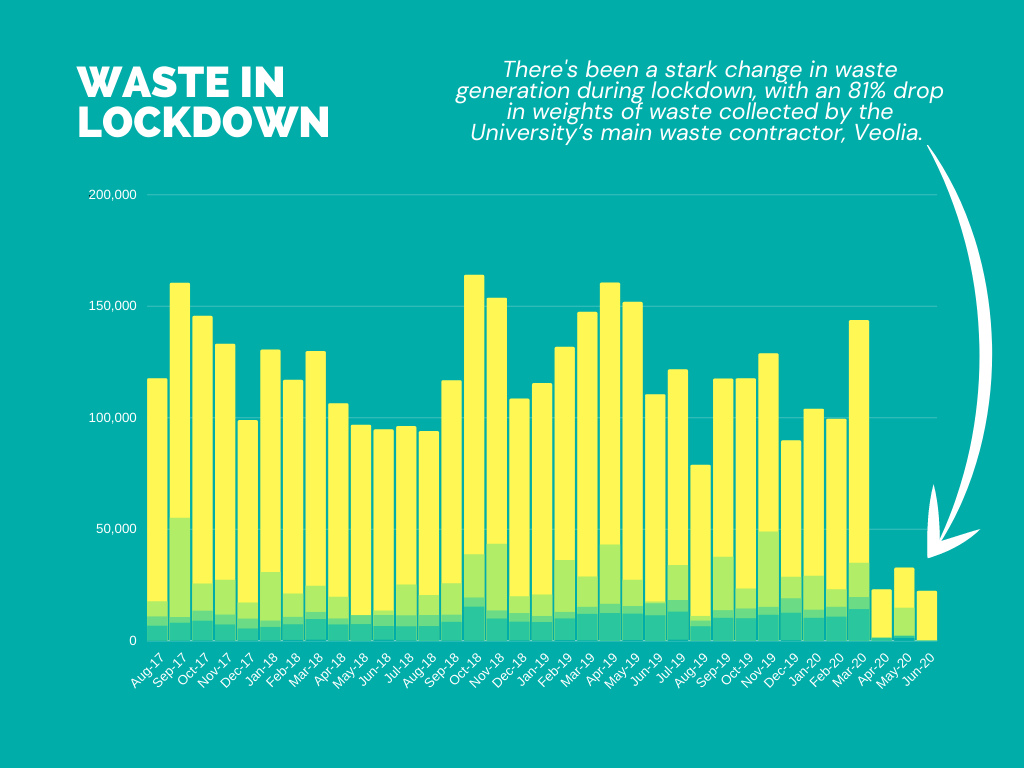
Submitted by Jessica Haskell on Wed, 2020-07-29 14:04
Four months into the University of Cambridge’s estate being locked down, impacts on the University’s environmental performance are becoming clear. At the time of writing, electricity and gas use in University buildings has dropped between 35–50% and 35–70% respectively. Staff commuting has dropped drastically and flying for work has almost entirely halted. The lockdown has also had a dramatic impact on the University’s waste generation. In this article we explore what’s happened with waste, what we might see as lockdown eases, and what staff can do to help minimise potential negative impacts as buildings begin to reopen.
How has our waste generation changed under lockdown?
The chart below illustrates the big drop in waste outputs recorded by the University’s main waste contractor. Some of this, like the energy reductions mentioned above, will simply have been shifted into a different setting – that of home workers. The nine tonnes a month of leftovers and tea bags that are typically disposed of from University cafes, event spaces and break rooms are one example, as it’s clear that much of this will simply be making its way into home green bins and garden compost heaps.
Will it come back?
Much more of the drop in waste won’t have been displaced and is the result of the unfortunate disruption of important research and teaching activities. A waste audit last year showed that lab-related wastes are the top item found in University bins, while the second most common item, cardboard, partly results from deliveries to labs. These will likely rebound after lockdown and we’ll see levels return to ‘normal’.
Five things you can do to help manage waste in your department
While there is an inevitability of some of the University’s waste generation, there’s still plenty that can be done to minimise waste. Here are our top five ways that you and your colleagues can get together to make a positive change.
1) Keep up the paper reductions!
While there are negatives for waste generation which are emerging from the lockdown period, one clear positive has been highlighted in responses to a recent OurCambridge survey which asked staff for their perspectives of lockdown. As one respondent put it, “without a printer, I've basically been forced to go paperless, but I've realised I don't really need to print most of what I usually would!”. Others have changed whole processes or use new technology, with one staff member commenting that the lockdown has “forced my organisation to go paperless and adopt new ways of working”. It’s clear that now is the time for encouraging both behavioural and policy changes to minimise paper use. 10% of our waste is made up of paper, so if these changes continue beyond lockdown, just think of the impact it could make! Check out our waste reduction guidance for some ideas on cutting paper use.
2) Avoid unnecessary PPE, and promote reusable options
In the UK alone some 761 million pieces of PPE, largely made from plastic, were distributed from February to April 2020. As the current government guidance advises against PPE use outside of clinical settings, we shouldn’t expect any extra use in most University buildings. However, facemasks are advised to be used. Disposable facemasks have the potential to generate significant amounts of waste, so the UK government has produced simple guidance on making a reusable facemask, which can be washed again and again. Encourage your colleagues to use reusable masks to ensure we all cut down on waste!
If you are using PPE, there are limited options for the recycling of PPE other than the Kimberley Clark ‘RightCycle’ scheme for KimTech purple nitrile gloves. Nearly 4 million of these gloves are used within the University every year – that’s a pair for everyone in Latvia or, laid end-to-end, enough to stretch from Cambridge to Munich! The Environment & Energy Section are launching a trial of the RightCycle scheme, so interested departments can get in touch to find out more.
3) Cut down on cleaning waste
As well as PPE, initial indications are that as departments reopen they will be bringing in new procedures which could result in extra waste from used cleaning or sanitary items. As an example, most departments are switching off electric hand dryers and switching to paper towels, a move that could result in an increase in unrecyclable waste. In early July, the University’s network of Environment & Energy Coordinators met to discuss this issue. Some great ideas emerged from best practices that departments have adopted:
- Two departments have been opting for mixing their own hand sanitiser for use in re-fillable dispensers, and similar for cleaning spray bottles. By refilling these instead of replacing the whole unit when empty, they’re avoiding the waste associated with single use disposables.
- In terms of disposable cleaning cloths/wipes for personal use, one department has set up self-cleaning stations. They provide spray bottles of C2 and microfibre cloths. They provide a bag for used cloths and change them regularly through the day, with the cloths getting washed overnight.
- For disposable wipes, one department has found that there are biodegradable ones on UFS - Bio-pure alcohol wipes. They're available from Sigma and Scientific Laboratory Supplies. The suppliers claim the packaging has a low carbon footprint too.
Our Environment & Energy Yammer page is a great place to let us know if you’ve done anything else which others should know about!
4) Use this chance to review and refresh waste bins and signage
As we begin the process of moving back into University buildings, now would be an ideal time to refresh bin layouts and signage, to make sure people who’ve been away from the office for months are reminded of how to recycle. It’s worth mentioning that the University is due to re-tender its main waste contract in the coming months, which could mean a change from the current main contractor, Veolia (formerly Mick George), so the current bin signage is likely to be updated soon. However there's a brand new set of comprehensive guidance on ways to improve recycling on our website which outlines other things to consider, including 7 simple tips for bin layout and placement. You can also take a look at how your department can focus on reducing and reusing waste, or visit our recycling A-Z for the latest on what goes in which bin and ideas on how to recycle common items.
5) Cut out waste at the source
While we can all help the cause by making sure we sort our waste properly, another key focus should be to think about how waste can be minimised at source, kept in use for as long as possible, or reused within the University. There’s never been a better time to encourage your colleagues to sign up to the University’s WarpIt portal, which facilitates internal reuse. Whether it’s surplus furniture or equipment resulting from office shift-arounds, excess stocks of cleaning materials or PPE from over-zealous ordering, or printer cartridges and pens that are at risk of gumming up as they sit unused in stock cupboards, WarpIt is the best place to make sure that nothing goes to waste in the University.

